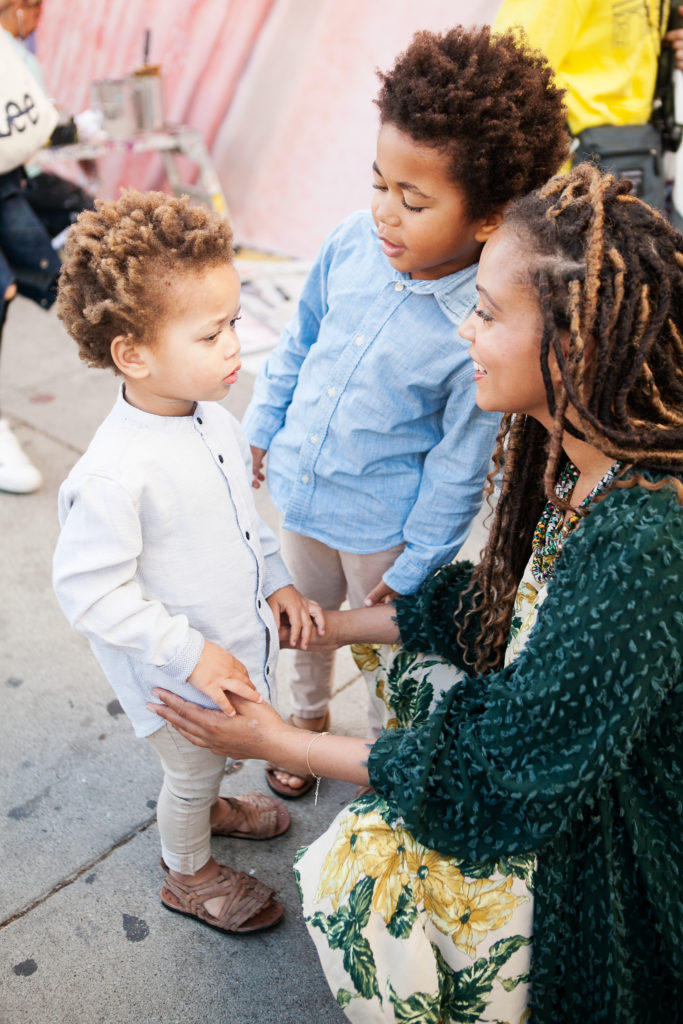I recently watched this documentary, “(Dis)Honesty: The Truth About Lies.” The film focuses on how and why people lie. Through on-camera confessions and behavioral experiments, scientists and everyday people talk about their motivations behind not telling the truth. I started thinking about myself as a parent and how I relate to my boys regarding what I tell them and what I shield from them. It took me down this crazy rabbit hole of thoughts: when have I lied to my kids? What things did I lie about? What’s okay to lie about? What’s not okay? Is it EVER okay to begin lying to children?
As I mentally debated the topic with myself, I found myself torn. My parents always believed in telling me the truth. To be fair, though, I didn’t make it easy for them to not tell me what I wanted to know. As a child I was a constant questioner and not easily satisfied by a simple, fake answer. I would challenge my parents over and over until the topic or answer made sense to me. I sort of wore my mom down and forced her to parent in a specific way because a little brush-off answer didn’t work for me; it only made me more curious. I kept asking until she finally told me what I wanted to know — in a kid version, of course. (I think I actually got in trouble for telling people where babies came from!)
Being a parent of kids who aren’t anywhere near double digits, I find fudging the truth to oftentimes be the more palatable option for certain situations. More often than not, I’m the parent who will say, “we don’t have any ice cream,” over the truth, which, frankly, is, “we have ice cream, but you can’t have it.” Or, there are times when it comes to toys and I use what I call “imaginary talk.” Instead of telling my son he can’t play with his toys at inopportune times, I’ll maybe say, “You can’t play with your toys right now because they need to take a nap.” Is that considered lying to my children? Technically, I guess it is. But not really. Maybe.

I think it’s okay to tone down the world to their level until they grow into more mature learning and understanding. When I think about what I say to them, I think more in terms of altering circumstances to a G- or PG-rated understanding. If that’s what you’re doing as a parent, I think that’s fine. I believe it’s your job to put the world in a four-year-old paradigm for your toddler. That may mean shielding a mystery over here or watering down adult details over there, and so on. Still, there may be some untruth-telling in that.
As parents, we’re all going to have to choose our battles regarding the hard truths we tell versus lying to children. And let’s face it: we’re all going to lie to our kids at some point. If your prepubescent child walks in on you and hubby enjoying physical “quality time,” is that the right time to be honest and say, “Daddy and I are having sex, honey”? Mmm…I doubt it. There are other hard topics that will come up as my boys age. Will I be honest about some of my life experiences and lessons I learned the hard way? At this point, I really don’t know. My kids aren’t there, and neither am I. It may sound like a cop-out to say I’ll cross that bridge when I get to it, but that’s all I have for now.
I’ve also been asked how I am going to handle the truth about my divorce if my boys start to ask questions in the coming years. If I could have my way, that subject would remain an uncovered truth until they’re at least 18. Realistically, though, much of how I handle that will be determined by professional family and marriage counsel mutually agreed upon by my ex-husband and myself. What I’m choosing to do right now as a parent is treat “truth” as a flashlight, shining it where I feel it’s best needed and not shining it in other places — like any potentially negative aspects of divorce.
I firmly believe our children need certain foundations to feel secure in their families and in the world. They need to see their parents get along, even if there’s an undercurrent that has nothing to do with them. They need to hear their parents compliment each other, regardless if feelings are a little more raw than what kids should know (or probably understand). I don’t necessarily believe those are lies. They’re simply what’s needed for the time.
I don’t profess to have the whole “lying to children” topic fully figured out. All I know is that my kids are just that: kids. They’re still growing, developing, and becoming people. Until they can see with their own eyes of maturity, I believe it’s up to me to guide them toward good decision-making and understanding. Later on in life, that may mean helping them deal with some harder truths of life. For now, though, my truth is their truth, and I think I’m good with that.
***
I would REALLY love to know how you handle telling the truth to your kids. How do you determine what you tell, when you tell it, and how much of it to tell? Share your thoughts in the comments below!




replies (0)